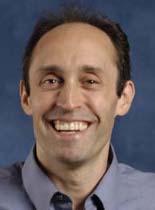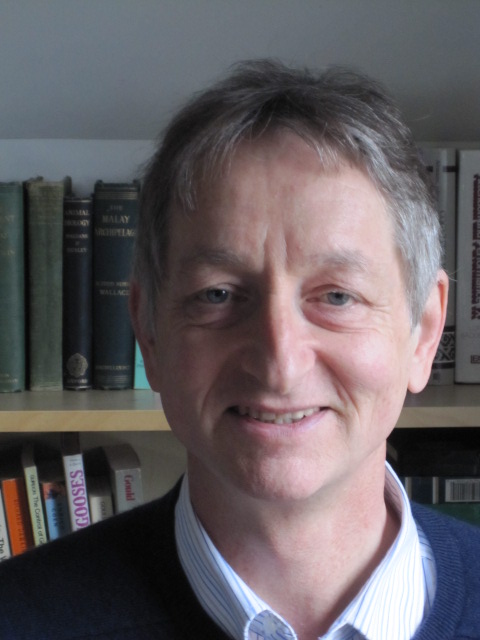Prof. Jeff Bilmes
Professor Bilmes is a professor at the Department of Electrical Engineering at the University of Washington. He is also an adjunct professor in Computer Science & Engineering and the department of Linguistics. He is also a co-founder of the Signal, Speech, and Language Interpretation Laboratory here in the department. He received his Ph.D. from the Computer Science Division of the department of Electrical Engineering and Computer Science, University of California in Berkeley.
His primary interests lie in statistical modeling (particularly graphical model approaches) and signal processing for pattern classification, speech recognition, language processing, bioinformatics, machine learning, submodularity in combinatorial optimization and machine learning, active and semi-supervised learning, and audio/music processing. He has received many awards, including an NSF Career award, a CRA Digital Government Fellowship, and a NAE Gilbreth Lectureship award.
Prof. Jason Eisner

Jason Eisner is Associate Professor of Computer Science at Johns Hopkins University, where he is also affiliated with the Center for Language and Speech Processing, the Cognitive Science Department, and the national Center of Excellence in Human Language Technology. He is particularly interested in designing algorithms that statistically exploit linguistic structure. His 80 or so papers have presented a number of algorithms for parsing and machine translation; algorithms for constructing and training weighted finite-state machines; formalizations, algorithms, theorems and empirical results in computational phonology; and unsupervised or semi-supervised learning methods for domains such as syntax, morphology, and word-sense disambiguation.
Prof. Geoffrey Hinton

Geoffrey Hinton received his BA in experimental psychology from Cambridge in 1970 and his PhD in Artificial Intelligence from Edinburgh in 1978. He did postdoctoral work at Sussex University and the University of California San Diego and spent five years as a faculty member in the Computer Science department at Carnegie-Mellon University. He then became a fellow of the
Canadian Institute for Advanced Research and moved to the Department of Computer Science at the University of Toronto. He spent three years from 1998 until 2001 setting up the Gatsby Computational Neuroscience Unit at University College London and then returned to the University of Toronto where he is a University Professor. He is the director of the program on "Neural Computation and Adaptive Perception" which is funded by the Canadian Institute for Advanced Research.
Geoffrey Hinton is a fellow of the Royal Society, the Royal Society of Canada, and the Association for the Advancement of Artificial Intelligence. He is an honorary foreign member of the American Academy of Arts and Sciences, and a former president of the Cognitive Science Society. He has received honorary doctorates from the University of Edinburgh and the University of Sussex. He was awarded the first David E. Rumelhart prize (2001), the IJCAI award for research excellence (2005), the IEEE Neural Network Pioneer award (1998), the ITAC/NSERC award for contributions to information technology (1992) the Killam prize for Engineering (2012) and the NSERC Herzberg Gold Medal (2010) which is Canada's top award in Science and Engineering.
Geoffrey Hinton designs machine learning algorithms. His aim is to discover a learning procedure that is efficient at finding complex structure in large, high-dimensional datasets and to show that this is how the brain learns to see. He was one of the researchers who introduced the back-propagation algorithm that has been widely used for practical applications. His other contributions to neural network research include Boltzmann machines, distributed representations, time-delay neural nets, mixtures of experts, variational learning, products of experts and deep belief nets. His current main interest is in unsupervised learning procedures for multi-layer neural networks with rich sensory input.
Prof. Ruslan Salakhutdinov
Ruslan Salakhutdinov received his PhD in machine learning (computer science) from the University of Toronto in 2009. After spending two post-doctoral years at the Massachusetts Institute of Technology Artificial Intelligence Lab, he joined the University of Toronto as an Assistant Professor in the Departments of Statistics and Computer Science.
Dr. Salakhutdinov's primary interests lie in statistical machine learning, Bayesian statistics, probabilistic graphical models, and large-scale optimization. He is the recipient of the Early Researcher Award, Connaught New Researcher Award, and a Scholar of the Canadian Institute for Advanced Research.
Prof. Max Welling
Max Welling is a Professor of Computer Science at the University of Amsterdam. He is currently on leave from the University of California Irvine where he joined in 2003. He held postdoctoral positions at Caltech (’98-’00), University College London (’00-’01) and the University of Toronto (’01-’03). He received his PhD in ’98 in theoretical physics.
He is associate editor in chief of the IEEE Transactions on Pattern Analysis and Machine Intelligence (TPAMI), serves on the editorial boards of JMLR and JML and was an associate editor for Neurocomputing, the Journal of Computational and Graphical Statistics and TPAMI. In 2009 he was conference co-chair for AISTATS and in 2013 he will be conference co-chair for NIPS. He received multiple grants from NSF,
NIH and ONR-MURI among which an NSF career grant in 2005. He was recipient of the Dean’s midcareer award for research in 2008, the ECCV Koenderink Prize in 2010, and the best paper award at ICML 2012. His research focuses on large-scale statistical learning. He has made contributions in distributed Bayesian learning, variational Bayesian learning, learning of Markov random Field models, approximate inference in graphical models, visual object recognition and statistical shape analysis. He has over 100 academic publications.
Prof. Alan Yuille
Professor Alan L. Yuille holds a full-time position at Department of Statistics, University of California, Los Angeles. He also holds courtesy appointments in the Department of Psychology, Department of Computer Science, and Department of Psychiatry. He is a director of UCLA Center for Cognition, Vision, and Learning. He is affiliated with UCLA Staglin Center for Cognitive Neuroscience, UCLA Center for Computational Biology, and Korea University.
Alan Yuille received the BA degree in mathematics from the University of Cambridge in 1976. His PhD on theoretical physics, supervised by Prof. S.W. Hawking, was approved in 1981. He was a research scientist in the Artificial Intelligence Laboratory at MIT and the Division of Applied Sciences at Harvard University from 1982 to 1988. He served as an assistant and associate professor at Harvard until 1996. He was a senior research scientist at the Smith-Kettlewell Eye Research Institute from 1996 to 2002. He joined the University of California, Los Angeles, as a full professor with a joint appointment in statistics and psychology in 2002. He obtained a joint appointment in computer science in 2007. His research interests include computational models of vision, mathematical models of cognition, and artificial intelligence and neural networks.